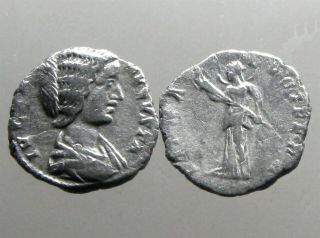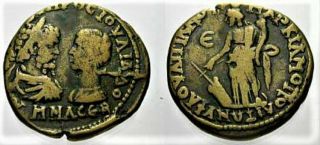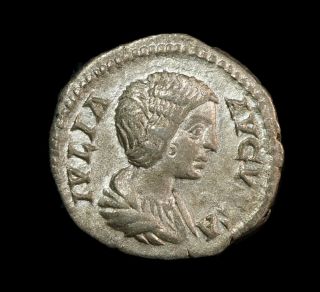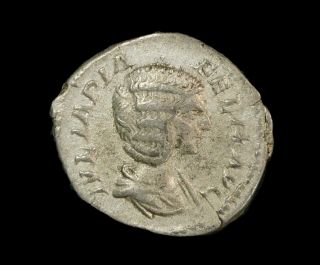JULIA DOMNA 211 AD Luna Lucifera In Chariot. Silver Roman Coin, Certified NGC AU
Item History & Price
[ 6334 ]
JULIA DOMNA, wife of Septimius Severus
Silver Antoninianus (5.65 gm.) Rome, 211-217 A.D.
References: C 106 var. (without crescent on Luna's head). BMC Caracalla 8. RIC Caracalla 379a var. (without crescent on Luna's head).
Certification: NGC Ancients AU Strike: 5/5 Surface: 4/5 4371790-004
IVLIA PIA - FELIX AVG. Diademed and draped bust right on crescent.
LVNA LVCIFERA Luna in biga left with cloak floating around head. Provided wit...h certificate of authenticity.CERTIFIED AUTHENTIC
by Sergey Nechayev, PhD -
Numismatic ExpertJulia Domna (unknown date-217) was a member of the Severan dynasty of the Roman Empire. Empress and wife of Roman Emperor Lucius Septimius Severus and mother of Emperors Geta and Caracalla, Julia was among the most important women ever to exercise power behind the throne in the Roman Empire.
Family backgroundJulia was of Syrian origin from the ancient city of Emesa. Her ancestors were Kings Priest of the famous temple of Baal. The family lost its kingdom to Rome but continued domination of the temple of Baal. The family had an enormous wealth and was promoted to Roman senatorial aristocracy. She was the youngest daughter of high-priest Gaius Julius Bassianus and her eldest sister was Julia Maesa. ReignIn the late 180s, Julia married future Emperor Septimius Severus who himself was in part of Punic background. The marriage proved to be a happy one and Severus cherished his wife and her political opinions, since she was very well read and keen on philosophy. Together, they had two sons, Lucius Septimius Bassianus (Caracalla) in 186 and Publius Septimius Geta in 189. Civil WarWhen Severus became emperor in 193 he had a civil war waiting for him, against rivals such as Pescennius Niger and Clodius Albinus. Julia accompanied him in his campaigns in the East, an uncommon event in a time when women were expected to wait in Rome for their husbands. Nevertheless, she remained with the emperor and among the several proofs of affection and favour are the minting of coins with her portrait and the title mater castrorum (mother of the camp).Julia now had complete power and ruled behind the Roman Empire. Many early Romans disliked the fact of her ruling over the throne when Septimius Severus was at war. Controversy and transition of powerAs empress, Julia was often involved in intrigues and had plenty of political enemies who accused her of treason and adultery. None of these accusations were proven, Severus continued to favour his wife and insisted on her company in the campaign against the Britons that started in 208. When Severus died, in 211 in York, Julia became the mediator between their two sons. Caracalla and Geta who were to rule as joint emperors, according to their father's wishes expressed on his will. But the two young men were never fond of each other and quarrelled frequently. Geta was murdered by Caracalla's soldiers in the same year.Caracalla was now sole emperor, but his relations with his mother were difficult, as attested by several sources, probably due to his involvement in Geta's murder. Nevertheless, Julia accompanied Caracalla in his campaign against the Parthian empire in 217. During this trip, Caracalla was assassinated and succeeded (briefly) by Macrinus. On hearing about the rebellion, Julia chose to commit suicide. Her body was brought to Rome and placed in the Sepulcrum C. et L. Caesaris (perhaps a separate chamber in the Mausoleum of Augustus). Later, however, both her bones and those of Geta were transferred by her sister Julia Maesa to the Mausoleum of Hadrian. She was later deified. Payment & Shipping: Will accept payments via PayPal.
00063



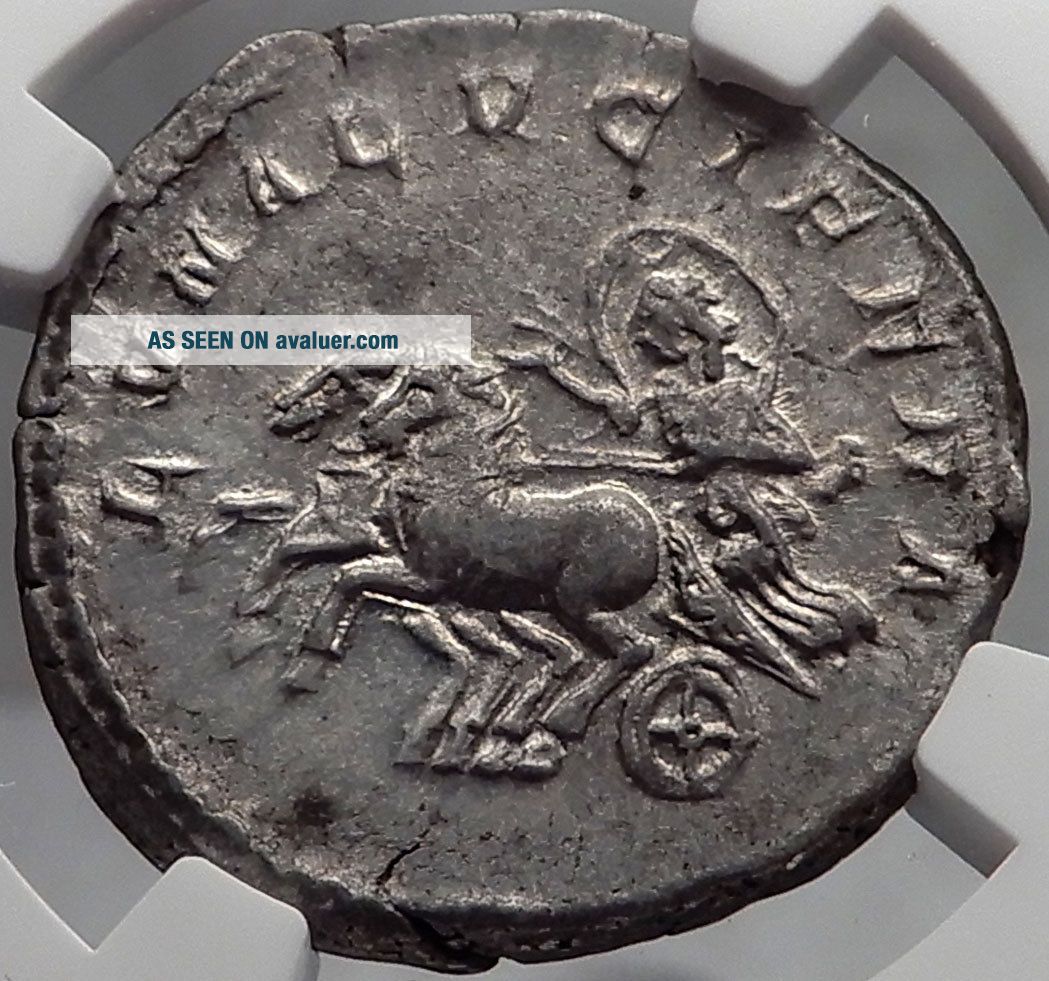
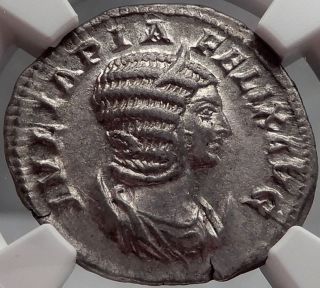
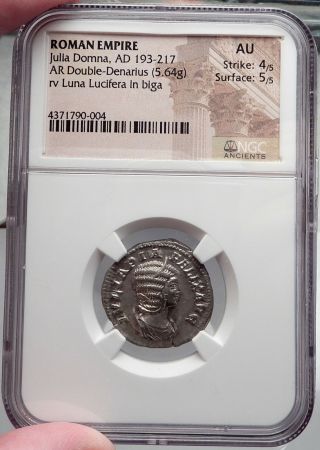
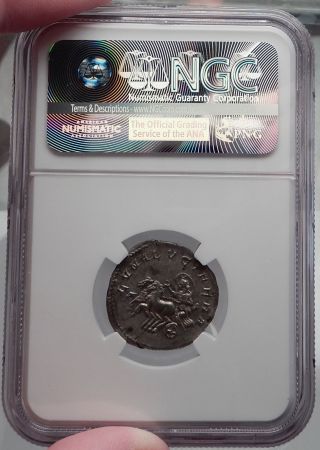
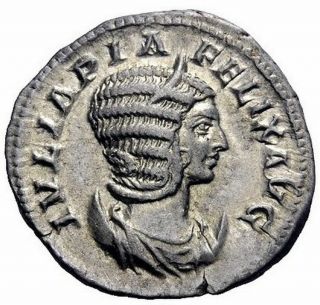
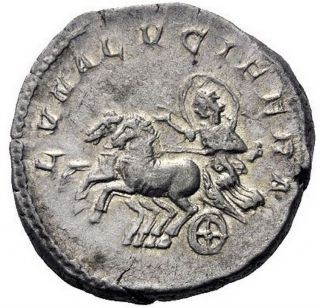
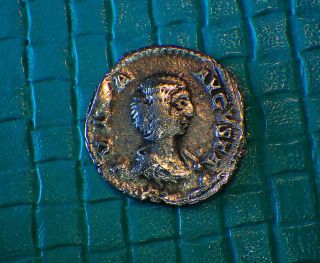
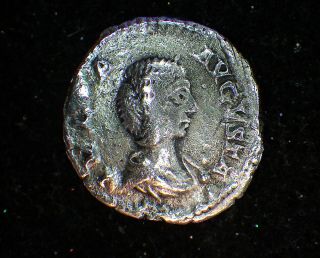
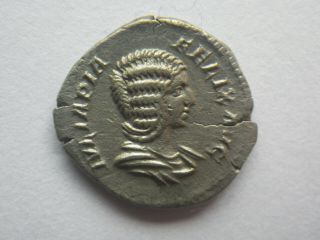
![Roman Empire Julia Domna 211 - 217ad Ar Denarius Xf Ric 373a[carac] $150 Value](https://pic-l.avaluer.net/imgstmb/d/p/c/g/f/-roman_empire_julia_domna_211___217ad_ar_denarius_xf_ric_373acarac_150_value-1_21000_tmb.jpg)
